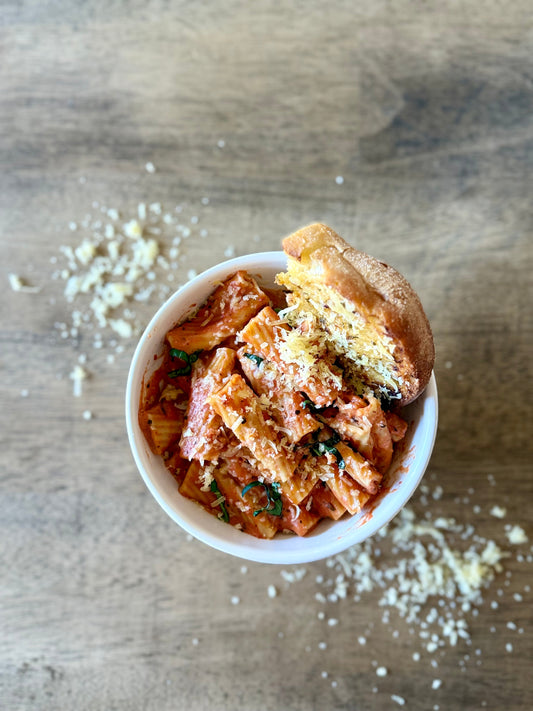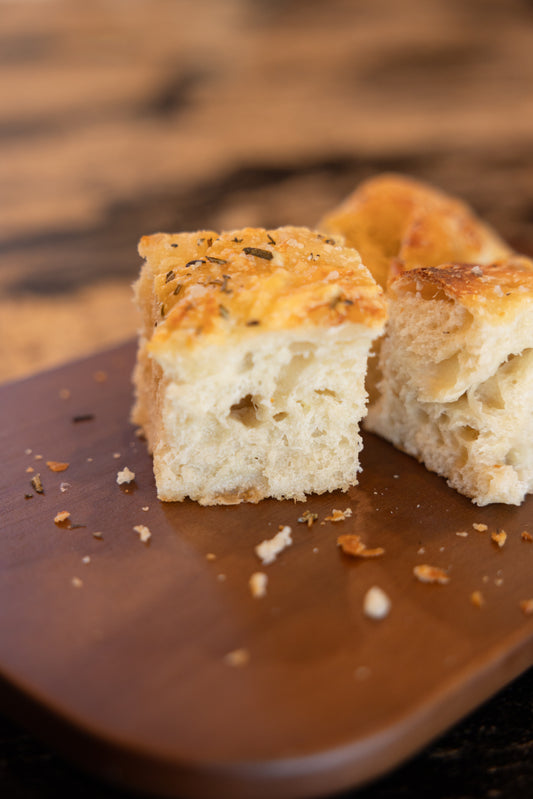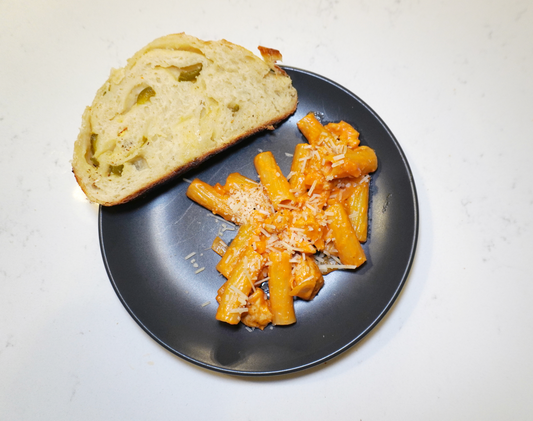This interview was conducted by Sara, our Head Cheesemaker.
I know you're exceptional as a chef in your commitment to using local products and supporting local farmers, and I know you consistently make delicious amazing, food. So, I wonder, what do you find challenging about working with local producers?
Barney: I don’t know. I just do what I can. Purchasing local is avoiding the convenience of say, Cisco. Sourcing locally means that I have to contact real people, so it’s not just placing one phone call or pushing buttons on an app. The convenience factor... I guess that's the biggest hurdle.
But, I think it’s just better [to buy local]. I think it just makes my life better because I get to, at least sometimes, go to the farm, go to the farmers market. I make it a point to go to the farmers market… there have been a few times when it’s just too busy at the restaurant, but most of the time… I’ve just made the commitment.
It’s less of a gamble. I’m not saying send me a case of bell peppers, and send me a case of squash, and send me a case of whatever and then it comes in, you’re not exactly sure of the weight, you’re not exactly sure of the quality and you’re only being given whatever it is that you might see on a list.

Whereas, I get to go to the market, and I see something that I maybe was not at all planning on buying, and maybe there’s only four of them or maybe there’s a shitload, but like, say when the Escamillo peppers are on and Craig’s got them and First Frost has them... that means I can make my batch of local hot sauce and I just start buying them … I guess for me it helps me to plan ahead, talking to the farmers…
Also, it just feels better to spend money in the community because we know that when we’re spending that money in the community, it’s staying in the community and… where we’re a small, little isolated valley in northern Utah, I feel more of a responsibility to do this.
Also there’s the pride factor. There’s the – this is where we’re from, this is where I was born, this is where I was raised – it’s a beautiful valley. We have people that are busting their ass putting seeds in the ground, or milking cows or whatever it is … to make these products, and I know that I can be the outlet. And I know that our customer base here, especially, is receptive. It feeds back into that responsibility – what I’m doing is the right thing, it feels better...
When did you first have Rockhill cheese?
Barney: It was in 2014 when I was at Herm’s that I decided I was going to the farmers market every week… that’s when it became more apparent that, oh yeah, there’s this excellent cheese that I can use. At Herm’s it was much harder to use these ingredients, there was no way I could do a regular charcuterie night, no way I could do a regular fresh pasta thing and have it be something that happened as the norm…
What is it about Crumb Brothers that makes that possible?
Barney: Well, we’re an artisan bakery. Here I’ve felt the responsibility to have my food be to the level that the bread is. Because, you go to San Francisco, and I’ll put up our bread against almost every single bakery there no problem... hands down, I’ll say throw our bread right in that mix. Our baguettes are awesome, our ciabatta is amazing, our sourdough is great…

Tell me about how you use Rockhill cheese at Crumb Brothers.
Barney: We’ve been using more lately because of the charcuterie nights. We throw it on all of the “everything” platters, which are based on what’s seasonal, local, or on hand.
So right now, we’re in the dead of winter. What’s seasonal right now? Nothing. What’s local that I have right now? Winter stored squash. Cheese. What’s on hand? We’ve got our bread, we’ve got whatever whipped butter... I don’t keep a detailed record of every single whipped butter that we’ve done, but we’re always doing different things for Wine Wednesdays or for Sunday brunch special, or whatever other projects we’re working on. I think the first week that we started it was a kimchi whipped butter, and I always have kimchi on hand so it was kind of a no brainer.
At Crumb Brothers Artisan Bread in Logan, Chef Barney uses Rockhill cheese on charcuterie platters, which are based on what’s seasonal, local, or on hand.

And your charcuterie does pretty well? People order it and like it?
Barney: Oh yeah. I mean we switched the focus, at least in these cold months, to the fresh pasta just because it’s cold. We’re in northern Utah, and you’ve got to have something more for people than just a plate of breads, meats cheeses, pickled vegetables, fruits, whatever. We needed something that was warm and hearty and maybe more filling. You know, cold weather stuff and so, it was like okay, let’s do fresh pasta. That’s something we love to do.
And I know that I’m not… I did not learn this stuff from my grandmother. This is something that I’ve chased through my career, and I love it. What was I given for my birthday? I was given a pasta roller set for my Kitchen Aid. The thing is, I love the process of making pasta. I love pulling out the maker, clamping it to the table, rolling the pasta out by hand. All of the little movements that you do to make a thing, I take joy in those steps.
Chef Barney says, "The thing is, I love the process of making pasta. I love pulling out the maker, clamping it to the table, rolling the pasta out by hand. All of the little movements… I take joy in those steps."

That’s how I feel about making cheese. It just feels good.
Barney: It gives you a sense of purpose. It gives you a sense of fulfillment. At the end you can look at it and be like, I made that, and it’s fuckin’ good.
What’s your favorite Rockhill cheese?
Barney: For young cheese, I like the Farmhouse Gouda. I love the chewiness of it. If I’m just going to snack on a cheese – then that’s the one. For grating it onto the pastas, I really like the Wasatch Mountain Reserve, but I like them all.





